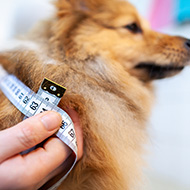
Survey reveals 2.7m dogs have piled on the pounds over the festive season.
New research by Guide Dogs has revealed that a fifth of British dog owners - equivalent to 2.7 million dogs - fear their dog will have gained weight over the festive season.
In a survey of 2,000 dog owners, one third admitted to giving their pups additional treats, and more than a quarter said their dog eats more than usual over Christmas period.
One in six owners said their dog doesn't eat their normal food during the festivities, with turkey, chicken and sausages among the items most given to pampered pooches.
When it comes to exercise, a quarter of owners said they take their dogs for fewer walks during the Christmas period. Cold weather and wanting to stay indoors because of shorter daylight hours were cited as the top reasons why owners didn't walk their dogs as much.
The research also revealed that more than a fifth of owners (24%) would like to know how to check if their dog is overweight. According to the Royal Veterinary College, one in 14 pet dogs in the UK are recorded as overweight by their vets.
In light of its findings, Guide Dogs has compiled some advice on fun activities dog owners can do with their pups to help them lose the excess weight.
Guide Dogs chief veterinary officer Tim Davies said: “Christmas is often a time of over-indulgence – and whilst it’s inevitable dogs might enjoy an extra treat or two over the festive season, it’s important they are kept active and maintain a healthy diet, to avoid putting on weight.
“Almost a third (29%) of those surveyed would like to know how to keep their dog’s fitness and health the best it can be. Our tips will help dog owners across the country feel inspired to get out and about with their dog and even include some fun fitness ideas to do from the comfort of your own home."



 The Animal and Plant Health Agency (APHA) has updated its online reporting service for dead wild birds.
The Animal and Plant Health Agency (APHA) has updated its online reporting service for dead wild birds.